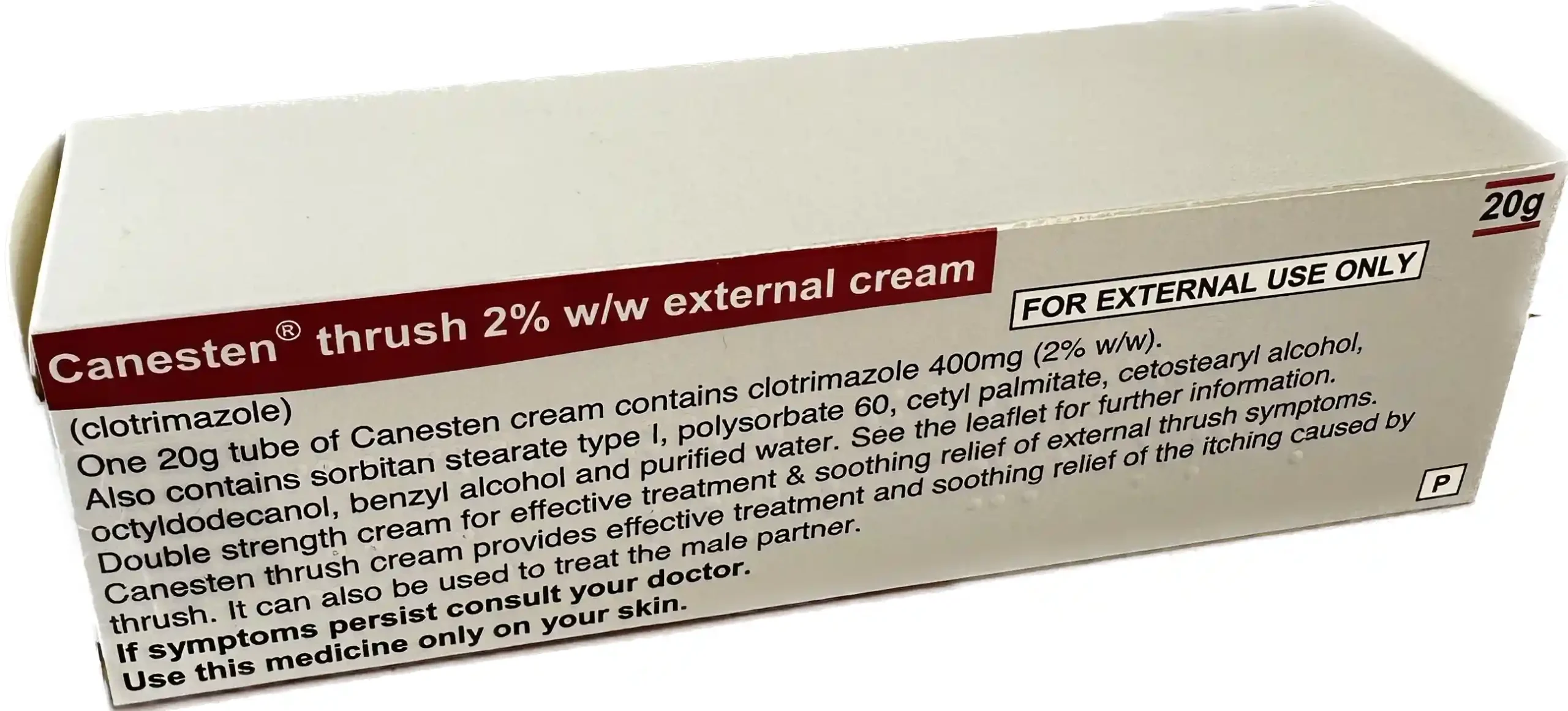Clotrimazole cream

Fastest delivery:
Order by 03:00pm
-

Quick, Discreet & Free Delivery
Swift, discreet, and cost-free delivery! Arrives as quickly as the next working day.
-

100% UK-based pharmacy
Our team of doctors and prescribers, and our support staff, are all UK-based.
-

Free support and advice
We're on hand to offer free support and advice by email and telephone (Mon - Fri 09:00 - 18:00).
-

We’re rated 4.9 out of 5
based on over 170 reviews collected on Google.
Description
Clotrimazole is used to treat fungal skin infections such as ringworm, athlete’s foot, fungal nappy rash and fungal sweat rash. It is also used to relieve irritation of the vulva (external thrush) or the end of the penis, which may be associated with thrush.
When Clotrimazole is applied to the infected area of skin it works by destroying the fungus or yeast which has caused the infection.
Warnings
Do not use Clotrimazole if you (or your baby if treating nappy rash) are allergic to clotrimazole or any of the other ingredients of this medicine.
Warnings and precautions
Talk to your doctor or pharmacist before using Clotrimazole if you have used a cream containing clotrimazole or a similar medicine before and suffered an allergic or unpleasant skin reaction.
This may have been a skin rash or itching in the area the cream was applied.
Do not smoke or go near naked flames - risk of severe burns. Fabric (clothing, bedding, dressings etc) that has been in contact with this product burns more easily and is a serious fire hazard. Washing clothing and bedding may reduce product build-up but not totally remove it.
Other medicines and Clotrimazole
Tell your doctor or pharmacist if you are taking or have recently taken any other medicines, including medicines obtained without a prescription. Clotrimazole is not known to interact with any other medicines.
As with other creams, Clotrimazole may reduce the effectiveness of rubber contraceptives, such as
condoms or diaphragms. Consequently, if you are using this cream on the vulva or penis, you should use alternative precautions for at least five days after using this product.
Pregnancy and breastfeeding
Clotrimazole Cream 1% can be used in pregnancy and breastfeeding. If you are pregnant or breastfeeding, think you may be pregnant or are planning to have a baby, tell your doctor, midwife or
pharmacist before using Clotrimazole. If you have informed your doctor or midwife already, follow his/her instructions carefully.
Directions
Always use this medicine exactly as described in this leaflet or as your doctor or pharmacist has told
you. Check with your doctor or pharmacist if you are not sure.
If you purchased this product without a prescription, follow these directions closely.
- Before use, pierce the tube seal by inverting the cap over the end of the tube and press.
- If the feet are infected, they should be washed and dried thoroughly, especially between the toes, before applying the cream.
- Clotrimazole should be applied thinly and evenly to the affected areas, two or three times daily and rubbed in gently.
- A strip of cream (½ cm long) is enough to treat an area of about the size of the hand.
- The duration of the treatment depends upon the type of infection. Use the cream for at least two weeks for candida (thrush) infections or at least one month for other infections.
- If you have athlete’s foot, it may help to use an antifungal dusting powder as well. Ask your doctor or pharmacist to recommend one.
- The symptoms of skin infection such as itching or soreness, should improve within a few days of treatment although signs such as redness and scaling may take longer to disappear. If symptoms
persist, consult your doctor
Ingredients
The active substance is clotrimazole. Each gram of cream contains 10 mg of clotrimazole (i.e. 1% w/w), or 20mg of clotrimazole (i.e. 2% w/w).
The other ingredients are benzyl alcohol , polysorbate 60, cetyl esters wax, cetostearyl alcohol, octyldodecanol, sorbitan monostearate and purified water.
Side Effects
Like all medicines, this medicine can cause side effects, although not everybody gets them.
As with all medicines, some people may be allergic to the cream. If you or your baby are allergic, a reaction will occur soon after you start using it. If you or your baby experience an allergic reaction, stop using Clotrimazole and tell your doctor straight away or contact the Accident and Emergency
Department of your nearest hospital.
Signs of an allergic reaction may include:
- Rash
- Swallowing or breathing problems
- Swelling of the lips, face, throat or tongue
- Weakness, feeling dizzy or faint
- Nausea
After you apply the cream you might experience:
Itching, rash, blisters, burning, discomfort, swelling, irritation, pins and needles, redness or peeling of skin. This may mean that you are allergic to the cream.

